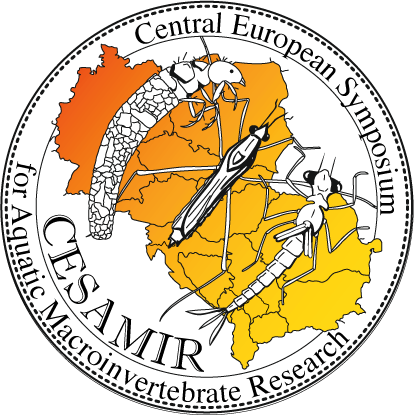
Sessions & Workshops
The CESAMIR2024 will include several sessions. Their final list and schedule will be available after abstracts submission and proposal evaluation.
The deadline for the workshop / special session proposals has already expired. We received three special sessions proposals.

Regular Sessions
After abstracts submission…
Special Sessions
SS1: Exploring aquatic diversity in the Carpathian biodiversity hotspot: from species level to molecular patterns
Organizers: Michał Grabowski1, Fedor Čiampor2, Tomasz Mamos1, Zoltán Csabai3
1Department of Invertebrate Zoology & Hydrobiology, University of Lodz, Poland
2Department of Biodiversity and Ecology, Plant Science and Biodiversity Centre, Slovak Academy of Sciences, Slovakia
Carpathian region, including both the Carpathian Arch and the Carpathian Basin, is recognised as a biodiversity and endemism hotspot of global importance. However, most of the studies focus on terrestrial organisms, while the aquatic biota and its distribution patterns are relatively poorly recognised. This is surprising, taking into account that the local freshwater resources are of critical importance and their biota is highly threatened. Besides the low level of awareness and low level of support for science, one of the reasons behind the lack of sufficient knowledge of the aquatic biodiversity in this region is insufficient cooperation between countries of the Carpathian region. Such fragmentation results in uneven distribution of specialists and funding as well as limiting the knowledge transfer. Another problem is the putatively high number of taxa difficult to recognise or even cryptic. Thus, this special session will focus on research documenting biodiversity as well as its spatial distribution patterns in ecological and evolutionary context in all kinds of aquatic ecosystems in the Carpathian Region. We invite all researchers, especially those working in poorly known taxa, less explored aquatic or whose research extends beyond one geographic region/country, to share their findings. This will help us all not only to correctly identify knowledge gaps on aquatic biodiversity in the region, but also to effectively fill them in the future through international cooperation.
SS2: Multilevel responses of aquatic macroinvertebrates to drying in freshwater ecosystems
Organizers: Núria Bonada1, Zoltán Csabai2, Thibault Datry3
1FEHM-Lab, Department of Evolutionary Biology, Ecology and Environmental Sciences, University of Barcelona, Barcelona, Spain
2Department of Hydrobiology, University of Pécs, Pécs, Hungary
3National Research Institute for Agriculture, Food and Environment (INRAE), UR RiverLy, Villeurbanne, France
The drying of freshwaters is increasing worldwide, exerting profound alterations on biological communities. Responses to drying appear at all levels of organization, from genes to physiological resilience and species distribution to metacommunity and food web structures. This special session gathers innovative and recent research on freshwater ecosystems, unraveling the profound effects of drying on aquatic macroinvertebrates. We expect several insights from the DRYvER project, but the session is open to anyone. Join us and share your findings, engage in insightful discussions, and contribute to our collective understanding of how aquatic macroinvertebrates navigate the unprecedented challenges posed by global change.
SS3: Advancing our understanding of freshwater biodiversity: the ecological relevance of aquatic parasites
Organizers: Kamil Hupało1,2, Sebastian Prati1,2, Jamie Bojko3,4
1Department of Aquatic Ecology, University of Duisburg-Essen, Germany
2Centre for Water and Environmental Research, University of Duisburg-Essen, Germany
3National Horizons Centre, Teesside University, Darlington, UK
4School of Health and Life Sciences, Teesside University, Middlesbrough, UK
Animals and plants are some of the best-characterised organisms globally. Since the invention of advanced microscopic methods, it is clear that microorganism diversity far outweighs that of “macro” organisms, However, our interpretation of biodiversity remains centric on them.
A particularly pertinent area of exploration are parasites. which are usually presented as harmful or negligible to macroinvertebrate health and wildlife conservation. Instead, parasites are proven to be crucial to the ecosystem’s health and functioning and a large component of its biodiversity. Despite their importance, parasites’ diversity, ecology, and evolution, remain largely understudied. A better understanding of these aspects is particularly relevant in the face of an ongoing global biodiversity loss, as parasites may exhibit high extinction rates due to their dependence on other species for survival. The special session will focus on research efforts to explore freshwater parasites and highlight their ecological relevance for a holistic understanding of freshwater ecosystems (parasite diversity, host-parasite interactions, eco-evolutionary dynamics, contribution of parasites to the ecosystem functioning etc.). We particularly encourage studies highlighting novel advances in DNA-based techniques. The presenters will be invited to submit their contributions to a dedicated special issue in the Journal of Invertebrate Pathology.
Workshops (open to everyone)
We have not received a proposal for a workshop, but should the need arise over time, we will do our best to include a possible (at least informal) workshop in the conference program 🙂
